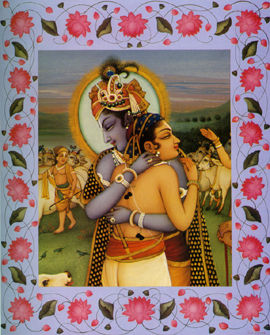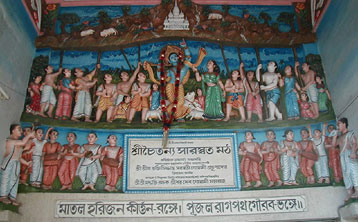
Question: I was recently invited to a program in Eugene, Oregon where it was said that the program would be in "vraja-bhava" so I was wondering how special is vraja-bhava and how does one actually attain it? When I went to the program there were various Hindi bhajans that I had never heard before and also some bhajans of Mirabai.
Answer: What many western devotees call vraja-bhava is available in any village kitchen in Uttara Pradesh, India. There are so many songs sung by the village people in and around Vrindavana but those are not the standard songs of pure devotion, particularly the songs of Mirabai. The pure aca rya never recommends his disciples to sing such songs.
Mirabai has been rejected by the Gaudiya-sampradaya as a psuedo-vaisnavi. There are some people who say that Mirabai was a half disciple of Srila Jiva Goswami but this is a concoction. Some say that simply by placing her hands over the eyes of the Rana of Mewar that he obtained Krsna darsana. Also some devotees are saying that Mirabai merged into the body of Krsna in Dwaraka and never came out again. But these are simply stories which have no ontological backing. These stories are rejected by the suddha-bhakti school.
Mirabai is not accepted as a suddha-vaisnavi by the followers of Bhaktivinoda Thakura and Sri Siddhanta Saraswati Thakura. Therefore the followers of Bhaktivinoda and Saraswati Thakura never teach their disciples to sing the bhajans of Mirabai. To teach one's disciple to sing the bhajans of Mirabai is equal to putting a kerosene rag in the mouth of that disciple.
Our Guru Maharaja, Srila Prabhupada sometimes said regarding Mirabai, "I have no objection to her songs". However Mirabai's songs were never established as standard bhajans in his mission. As far as the common person is concerned he had no objection. If a common person sings the songs of Mirabai there may be some namabhasa for that person. But for suddha-bhakti he has never recommended the bhajans of Mirabai. Mirabai is not in the suddha-bhakti school, what to speak of the raganuga, rupanuga, or rasika school. She is rejected by the Gaudiya-sampradaya as a bahiranga-bhakta, an external devotee.
Srila B.R. Sridhara Deva Goswami Maharaja comments as follows:
"Our Guru Maharaja announced, "We are suddha-sakta." We are worshippers of the potency, but not this mundane potency, but the potency wholesale dedicated to the possessor of the potency. Without retaining Her individual independence, cent per cent dependent - such potency very very rarely can be conceived. 'Direct approaches to Me that is not proper;' but approaching through proper channel, through the devotees, that is proper approach. That is real approach; so Gaudiya Matha eliminates Mirabai and so many other apparent devotees to be real devotees because they are mad in praise of Krsna, but not so much for the devotees of Krsna. (Feb 15, 1982, Sri Caitanya Saraswata Matha, Navadwipa Dhama)
As regards real vraja-bhava, Krsna says in Bhagavad Gita (18.66)
sarva-dharman parityaja mam ekam saranam vraja:
"Give up all your duties and come to Me. And your present duties good or bad, whatever you can conceive from your present position - give up everything and come straight to Me. I'm everything to you."
Here the word 'vraja' is used by Krsna to indicate Vrndavana, the Lord's own abode. In Vrndavana all the inhabitants are absorbed in the sweet mellows of spontaneous love of God. In a word they are absorbed in vraja-bhava, the mellows of loving devotion, found only in Vrndavana. So the fundamental principle of vraja-bhava is surrender. First surrender to Krsna. There must be complete surrender to Krsna, otherwise vraja-bhava will not manifest. Surrender means that we have given up all our tendencies to consume (enjoy). The attempt to assert one's self upon others must also be abandoned. This is real humility. In material life we want to assert ourselves over others and take everything for our own enjoyment. But vraja-bhava is just the opposite.
Neophytes, who have no real understanding of vraja-bhava, sometimes may advertise their program as being rasika or as being in the mood of vraja-bhava. Yet these persons have little or no real understanding of the exalted nature of the love of the inhabitants of Vrndavana nor do they have a clear conception of the path of attainment, even though they may claim to be following a rasika-acarya.
In fact, we see that their so-called vraja-bhava is only exhibited on Sundays, while the rest of the week they are absorbed in ordinary mundane activities. Those who are actually tasting vraja-bhava cannot tolerate even for a second to engage in ordinary financial dealings simply for the purpose of extending their material facilities.
Those who actually relish real vraja-bhava embrace a life of renunciation (sannyasa) and reject those things which are unfavorable for devotional service (pratikula). In this regard Srila Saraswati Thakura has said:
'aham-mama' bhava-sattve nama kabhu haya na
bhoga-buddhi na chadile aprakrta haya na
"The holy name is never revealed to one who is situated in the bodily concept of life and thinks in terms of 'I' and 'mine.' If one doesn't reject the enjoying mentality, the transcendental platform will never be attained."
anarthake 'artha' boli' ku-pathete laya na
"One should never mistakenly call material obstacles "useful for devotional service", thereby following the wrong path."
In his Anubhasya to verse 28 of the last chapter of Caitanya-caritamrta (Sri Gaudiya Matha edition) Srila Bhaktisiddhanta Saraswati Thakura has also written as follows:
"Those who are barren of the treasure of prema, propelled by duplicity, declare to the whole world their false attainment of prema, although in reality, by an external display of prema or by announcing it to one and all, it is positively impossible for such hypocrite destitutes who are deprived of the wealth of Krsna-prema to ever attain it. To make their great fortune known to everybody, adepts of prakrta-sahajiyaism often expose to each other insincere external symptoms of prema (such as shedding of tears). Rather than calling such hypocrite sahajiyas as 'premik', real suddha-bhaktas go as far as to completely reject their association knowing it to destroy bhakti. Suddha-bhaktas never teach one to designate such persons as 'bhaktas' thus equaling them with suddha-bhaktas. At the rise of genuine prema, the jiva hides her own glory and strives for Krsna-bhajan.'
"The hypocrite prakrta-sahajiya party in their greed for wealth, women and fame (kanaka-kamini-pratistha) offend suddha-bhaktas by labeling them as 'darsanik pandita' or (great philosophers), 'tattva-vit' (ontology experts), suksma-darsi (acute observers), and in turn they adorn themselves with the titles 'rasika', 'bhajannandi', 'bhagavatottama' (uttama-bhagavata), 'lila-rasa-panonmatta' (intoxicated by drinking sweet mellows of lila), 'raganugiya-sadhakagraganya' (the foremost aspirants on the path of raganuga-bhakti), 'rasa-jna' (the knowers of rasa), 'rasika-cudamani' (unsurpassed rasikas) etc.'"
"Having contaminated bhajan-pranali with the waves of their own materialistic emotions, they become attached to abominable practices; what they actually adore in themselves is pseudo-vaisnavism. These kinds of preachers go to describe aprakrta-rasa, making their respective mundane emotions a part and parcel of Krsna-seva. Unaware of aprakrta vipralambha-rasa, they take prakrta-sambhoga, which in essence is a perverted reflection of rasa (virasa), as actual rasa."
Those who have prema never boast of their love for Krsna because the nature of pure love for Krsna is that one who has it feels that he doesn't have even a drop of it. Those who say they have prema, who say they are rasika, and who claim to be the distributors of vraja-bhava are basically cheaters. They have cheated themselves, and they are cheating others. They have deviated from the path of our acaryas.
Srila Bhaktivinoda Thakura in the introduction to the 4th verse of Siksastaka in his Amrta-pravaha-basya states:
premera svabhava - yaha premera sambandha
sei mane - krsne mor nahi bhakti-gandha
"The nature of prema is such that one who has got real connection with prema will think with dainya (humility). 'I possess not even a trace of bhakti'"
The so-called preachers of 'vraja-bhava' are always outraged when we speak on such topics according to the standard of our acarya Srila Bhaktisiddhanta Saraswati Thakura. The psuedo-vaisnava says that the jungle (aranya) is cut and now it is time to preach rasa-lila throughout the world. But such foolish persons do not realize that they are living in the jungle and the weeds of misconception have overgrown their creeper of devotion.
When challenged about their false conceptions, the so-called preachers of 'vraja-rasa' become angry and say that their tears are the proof that they are absorbed in prema. Yet these so-called rasika and prema-bhaktas do not show us any of the other qualities of pure devotion such as dainya (humility) etc., only a display of tears.
In this regard, the Guardian of Devotion, Srila Bhakti Raksaka Sridhara Deva Goswami Maharaja, has explained,
"By practicing, one can acquire that mental condition of shedding tears, and one can show many feats as though he were a real devotee. Merely the display of some peculiar external characteristics does not prove the presence of pure devotion. Real devotion is 'sudurlabha' - a very, very rare achievement."
Pure devotion is such a rare commodity that it can hardly be attained by one days devotion per week, especially when that devotion is adulterated with the enjoying spirit and other such gross anarthas.
Those who are bona-fide preachers of the religion of divine love, as inaugurated by Sri Caitanya Mahaprabhu, do not engage in rasa-vicara (discussion of rasa in public). The bona-fide preacher always preaches nama-pracara - the glories of the holy name.
This was emphatically stated by His Divine Grace, Srila B. P. Puri Goswami Maharaja:
"In your foreign countries there has appeared a party of prakrta-sahajiyaism. And it is not a matter of inventing something - what they speak is there in 10th Canto, in the works of the Goswamis, Srila Visvanatha Cakravarti Thakura. But the very fact of their speaking such higher topics to unprepared audiences, ignoring the glories of the Holy Name, who is the only real path to this higher lila, is namaparadha. Mahaprabhu never did like this. He was relishing these topics with a few of His antaranga-bhaktas, and was inspiring masses to perform nama-sankirtana, and He Himself performed sankirtana with great numbers of people. Pracara should be nama-pracara." (Feb. 7, 1996, Sridhama Mayapur, Gopinatha Gaudiya Matha)
We must be very strict and very, very vigilant about these points. That was the standard of Srila Bhaktisiddhanta Saraswati Thakura and that has been followed by his most stalwart disciples, such as Srila A.C. Bhaktivedanta Swami Prabhupada, Srila B.R. Sridhara Deva Goswami Maharaja, Srila B.P. Puri Goswami Maharaja. Srila B.D. Madhava Maharaja, Srila B.S. Goswami Maharaja, Srila B.P. Kesava Maharaja, and all others.
In conclusion, vraja-bhava requires complete surrender at the lotus feet of Krsna and the spiritual master. It is not a cheap thing! It requires a life of dedication. When one comes in connection with vraja-bhava he does not go out to sell cars the next day, carrying on life as usual, going out mountain biking on the weekend with his family and engaging in so many ordinary mundane activities. Vraja-bhava means "die to live", the absolute abnegation of all things mundane, and that is followed by full submission to guru and Krsna - that is vraja-bhava. Not simply singing Hindi bhajans - that is only namabhasa. It is not suddha-nama or pure devotion.

Pujala raga-patha inscription - Sri Caitanya Saraswata Matha

Closeup of Inscription
[ MP3 Recording of Srila Sridhara Maharaja saying this sloka. ]
